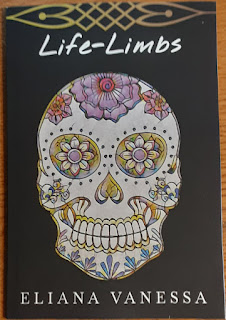Swords & Sorceries: Tales of Heroic Fantasy, Volume 5. Edited by David A. Riley. 328 pages. Published by Parallel Universe Publications. Cover and interior art by Jim Pitts.
This is the fifth volume in the acclaimed Swords & Sorceries series from Parallel Universe Publications. It’s the largest of the series so far and contains eleven stories, several of which are fairly long. The TOC consists of:
Introduction by
David A. Riley
THE ROTTED LAND
by Charles Gramlich
SKULLS FOR
SILVER by Harry Elliott
FOR THE LIGHT
by Gustavo Bondoni
PEOPLE OF THE
LAKE by Lorenzo D. Lopez
FREE DIVING FOR
LEVIATHAN EGGS by Tais Teng
THE BLACK WELL
by Darin Hlavaz
DEGG AND THE
UNDEAD by Susan Murrie Macdonald
THE MISTRESS OF
THE MARSH by David Dubrow
SILVER AND GOLD
by Earl W. Parrish
BRIDGE OF
SORROWS by Dev Agarwal
PRISONERS OF
DEVIL DOG CITY by Adrian Cole
Here are my thoughts.
The Rotted Land: The first story is mine and is third in a
series about a character named Krieg, who combines certain elements of REH’s
Kull and Karl Wagner’s Kane. It’s a traditional story doing something along the
lines of the “Northern Thing.” Another Krieg story is written and submitted and
I’m working on a fifth.
Skulls for
Silver is a great title. I don’t believe I’ve read anything by Harry Elliott
previously. He’s a British author. This is a fairly long story, also doing the
northern thing. Hel and Gul and Mann are the characters. Hel is a female fighter
and Gul a big, brawny warrior, while Mann is a swordsman. Interesting. You don’t
often see three characters in Sword & Sorcery settings. One or two seems to
be the rule.
For the Light is also the first story I’ve read by Gustavo Bondoni, although I’ve been facebook friends with him a long time and he is a very prolific author. Bondoni is from Argentina and is the only SF/Fantasy author I know from that area of the world. This story leaps into action. We have a chariot race to save the world and the main character is Semni. This was an early favorite for me in the collection and has one of those great endings that is surprising, although it seems inevitable in hindsight.
People of the Lake starts in a swamp, sort of like “The Rotted Land.” Lorenzo D. Lopez was another new writer to me, until I found in the Introduction that it’s a pseudonym for someone I have heard of before. Quite a lot of action in this one and some gory battles.
Free Diving for Leviathan Eggs. This tale has a bit of a high fantasy feel to it, and also reminds me of the work of Clark Ashton Smith. It quickly became another favorite for me, just because it is so beautifully written. I really loved the language and the whole tone of the tale. Great ending, too. Tais Teng is Dutch, which really makes this collection an international one. I’ll be seeking out more of Teng’s work.
The Black Well sounds like a Robert E. Howard title and Darin Hlavaz is certainly familiar with Howard, as well as Lovecraft, Leiber and Moorcock. This tale features a vast cyclopean city buried in a pit in the earth, very Lovecraftian in feel. This is one of the longer stories, very descriptive.
Degg and the Undead. Susan Murrie Macdonald is another facebook friend. She’s a relatively new writer but this tale shows plenty of polish. Degg is a relatively simple fellow who finds a cave and appropriates a fine sword that he discovers there. Unfortunately for Degg, the dead sorcerer who owned the sword does not take kindly to being stolen from. I really liked the ending, which surprised me.
The Mistress of the Marsh. Another marshy, swampy tale. A Roman legion marches into the wetlands to take it from the savage owners, and they get more than the bargained for. The locals, called Thucers, evoke images of Howard’s Picts, and indeed the tale has elements of Howard’s Conan tale of “Beyond the Black River.” David Dubrow is a Florida writer, also new to me.
Silver and Gold is by Earl W. Parrish, which is also a pseudonym. A post Roman tale about a hero named Pierre, a religious warrior who finds himself in love with a witch. How can he reconcile his spiritual duties and his love? Pierre and Jeannette, the witch, are particularly well-done characters.
Bridge of Sorrows is another great title. Dev Agarwal is also a British author, I believe, as well as editor for Focus Magazine. I remember reading a tale of the same characters, Simeon and Irene, from an early volume of this series. There’s a Howardian and Lovecraftian feel to this tale as well, with the enemy being a race known as the “Dagonists.” They’re not human, in case you couldn’t guess. This is a fairly long story as well, with quite a lot of action.
Prisoners of Devil Dog City is by Adrian Cole, who is certainly the best known writer in the collection. He is also British, and I’ve been a fan of his work since his Dream Lords trilogy in the 1970s. Here we have humans caught up in a battle of the gods, which is a theme that Cole frequently revisits. The gods and monsters are beautifully described here and this was definitely a fun story to end the collection with.
All in all, I can recommend this collection to everyone. Enjoyment to be had.







